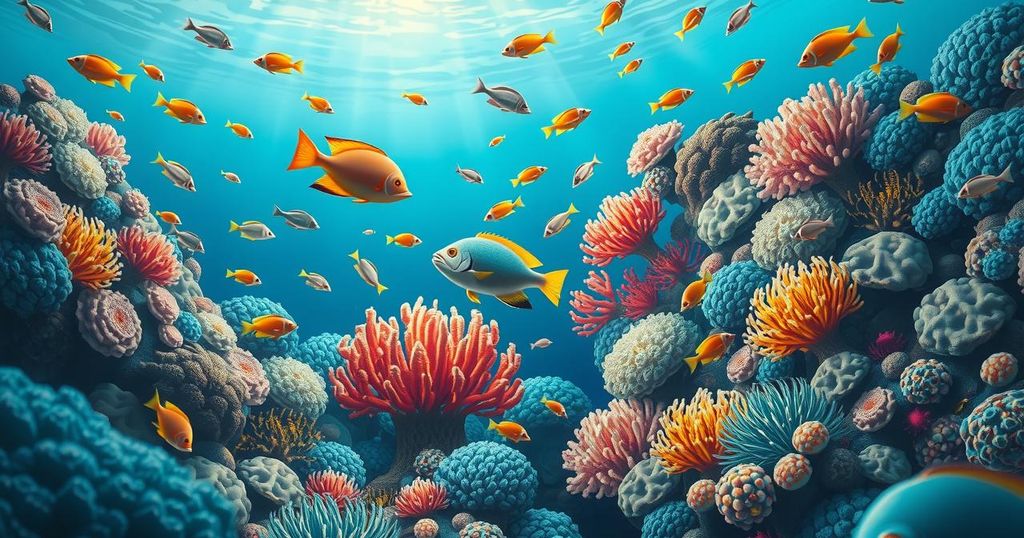Palau President Urges Trump to Experience Climate Change Firsthand Through Snorkeling
President Surangel Whipps Jr. of Palau invites U.S. President Donald Trump for snorkeling to witness climate change’s effects. He warns of rising sea levels affecting Palau and urges for a focus on climate action for future generations. Whipps critiques U.S. withdrawal from international agreements and stresses the need for global cooperation against climate change, while advocating for a moratorium on deep-sea mining.
Surangel Whipps Jr., the President of Palau, expressed a desire for U.S. President Donald Trump to join him for a snorkeling expedition to comprehend the profound impact of climate change, which he describes as a “slow death”. Whipps emphasized the necessity of recognizing the consequences of inaction concerning environmental issues and conveyed hope for a productive dialogue focused on financial matters related to climate initiatives.
Palau, an archipelago composed of approximately 340 islands, is acutely vulnerable to rising sea levels, with Whipps foreseeing the potential loss of some atolls in the near future. He reiterated that the threat of climate change is universal, urging Trump to consider the implications for future generations, including his own descendants.
Despite his strong stance on climate change, Trump has previously described it as a scam, withdrawing from the Paris Agreement and other international climate engagements. Whipps highlighted the domestic focus of many nations, including the U.S., but cautioned that the United States also has many low-lying areas susceptible to the impacts of climate change.
Palau, a nation of around 20,000 residents, remains a steadfast ally of the U.S. in a region where China’s influence is expanding. Whipps pointed out the detrimental effects of U.S. reductions in international aid, which have led to halting ocean monitoring programs. He warned that the U.S. retreat in global leadership might enable China to gain ground on climate issues, stating that “China is actually doing more for climate change these days than probably the US.”
In June, Whipps was re-elected after his administration extended U.S. military presence in Palau under a “Compact of Free Association” agreement. While maintaining diplomatic ties with Taiwan amid Chinese pressure, Whipps reaffirmed his administration’s commitment to peace and stability in the region.
Palau is advocating for a moratorium on deep-sea mining, contending that sufficient scientific data is lacking to assess the environmental risks. Whipps cautioned against the short-sightedness of nations opting for deep-sea mining as a solution to economic struggles exacerbated by climate change. He asserted that such actions would ultimately jeopardize future generations, stating, “You may think you’re saving your people now, but you’re really destroying their future.”
With calls for a swift transition away from fossil fuels, Palau and other climate-vulnerable nations have urgently sought financial support to combat the escalating climate crisis. Whipps poignantly remarked, “When it was Covid everybody just mobilised because we’re going to die, now. Climate change is like the slow death.” He urged President Trump to reflect on the legacies he aims to leave for future generations.
In conclusion, President Surangel Whipps Jr. of Palau has articulated the urgent need for global leaders, notably U.S. President Donald Trump, to comprehend the dire implications of climate change through firsthand experience. His advocacy for environmental action underscores the necessity for long-term thinking that prioritizes future generations over immediate economic gains. The discussion surrounding the balance between economic development and ecological preservation remains critical as nations confront the pressing realities of climate change. Additionally, through consistent plea for international cooperation and assistance, Whipps highlights the struggle of climate-vulnerable nations, as well as the risks posed by the diminishing U.S. involvement in global leadership on climate matters. This dialogue is essential as the world strives to combat the challenges posed by climate change.
Original Source: www.rfi.fr




Post Comment